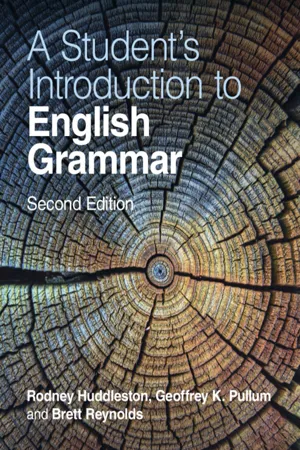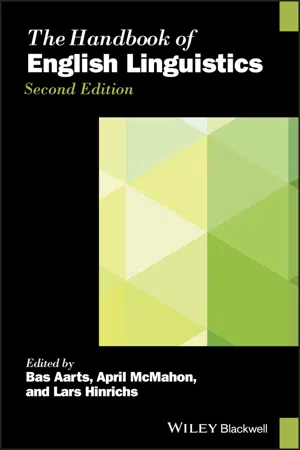Languages & Linguistics
Adjuncts
Adjuncts in linguistics are elements that are optional in a sentence and provide additional information without being essential to the sentence's structure. They can include adverbs, prepositional phrases, or clauses, and they typically modify verbs, adjectives, or other adverbs. Adjuncts can add detail, such as time, manner, place, or reason, to a sentence without changing its core meaning.
Written by Perlego with AI-assistance
Related key terms
1 of 5
5 Key excerpts on "Adjuncts"
- eBook - PDF
- Rodney Huddleston, Geoffrey K. Pullum, Brett Reynolds(Authors)
- 2021(Publication Date)
- Cambridge University Press(Publisher)
8 Adjuncts: Modifiers and Supplements 8.1 Introduction In this chapter we provide a brief overview of the ways in which clause structure may be elaborated or embellished by constituents in adjunct function. We divide Adjuncts into two kinds: modifiers, which are thoroughly integrated into the syntactic structure of clauses, and what we call supplements, which are much more loosely connected to the sentences in which they’re found. You’ll find considerable disagreement on terminology between different gram- mars. Adjuncts in general, and particularly modifiers in clause structure, are often called ‘adverbials’. This is a misleading term, because it suggests some connection to the adverb category, though there is none (Adjuncts can be NPs or PPs or AdjPs or clauses). And supplements are often called ‘parentheticals’ because of the way they are quite often (like this one) printed in round parentheses. The last five chapters have been structured around categories, but now we’re focusing on a single very general syntactic function with a broad array of subtypes, realized by a wide range of constituents of different categories. We’ll be mainly concerned with semantics: there is some correlation between semantic roles and syntax, which allows us to make a number of general syntactic observations, but meaning contribution is the primary way in which adjunct types differ. The present chapter may be helpful in working out how particular ideas can be expressed. Three difficulties complicate the task of completing a comprehensive survey of all the kinds of Adjuncts. • The boundary between Adjuncts and complements is not perfectly sharp. - eBook - ePub
- Bas Aarts, April McMahon, Lars Hinrichs, Bas Aarts, April McMahon, Lars Hinrichs(Authors)
- 2020(Publication Date)
- Wiley-Blackwell(Publisher)
2004 ). This in turn is followed by a fourth and final section on the perspective of usage‐based Construction Grammar, and an attempt to integrate the findings of linguistic gradience into a cognitively plausible, usage‐based framework.9.2 Quirk et al. (1985 ) on Complements and Adjuncts
9.2.1 Adjuncts
In their A Comprehensive Grammar of the English Language, Quirk et al. (1985 ) reserve the term adjunct primarily for particular adverbials (pp. 51–52), which, prima facie, might appear to be facultative. They argue, however, that some adverbials are indeed obligatory and complement the verb (which is why some grammars, but not Quirk et al., subsume them under the label of complements). The class of adverbials as a whole therefore “represent[s] a spectrum of types, the most central of which, because of their obligatoriness and relative immobility, resemble complements” (Quirk et al. 1985 , p. 52). Sentence adverbials, at the opposite end of the spectrum of adverbials (since these are mostly non‐obligatory), modify a whole sentence and are separated from the rest by an intonation boundary or comma. They can usually be classified as either conjuncts (with a connecting function), or disjuncts (i.e., comments on either form or function). Real Adjuncts (and subjuncts), by contrast, are more closely integrated into the clause structure, tend to be obligatory, and give information such as time, place, manner, degree, etc. (Quirk et al. 1985 , p. 52). These distinctions are illustrated by examples (1) to (4) below.- And they would forget that they were in the real world. (COCA 2017, Spoken, NPR: Fresh Air)
- But, nevertheless, her point’s well taken. (COCA 2017, Spoken, ABC: 20/20)
- To the best of my knowledge, the French have more than we do. (COCA, 2015, Spoken, CNN: State of the Union)
- Yeah. I expect he, you know they’re fairly busy but (pause) you they may well. (BNC, spoken, D97, S_meeting)
Example (1) illustrates what Quirk et al. call a (core) adjunct. It serves as an adverbial indicator of place, it is fixed in its position (*And they would forget that in the real world they were.), and it is obligatory in the sense that it is required by the verb for a complete, meaningful sentence (*And they would forget that they were - eBook - PDF
- Ewald Lang, Claudia Maienborn, Cathrine Fabricius-Hansen, Ewald Lang, Claudia Maienborn, Cathrine Fabricius-Hansen(Authors)
- 2013(Publication Date)
- De Gruyter Mouton(Publisher)
Modifying (the grammar of) Adjuncts: An introduction Ewald Lang, Claudia Maienborn, and Cathrine Fabricius-Hansen Adverbials are a rich and as yet relatively unexplored system, and there-fore anything we say about them must be regarded as quite tentative. Chomsky (1965: 219) We still have no good phrase structure theory for such simple matters as attributive adjectives [...] and Adjuncts of many different types. Chomsky (1995: 382) 1. Locating the volume If we believe the above statements from one competent to tell us, then we would have to concede that there has been no progress in our understanding of what seems to be a relatively unexplored system even after 30 years of linguistic endeavour. However seriously these statements are no doubt to be taken, there are also reasons for a moderate optimism. The situation may be spelled out by the various readings of the title of this volume. One aspect of the progress being made is that the focus of attention has widened. Adverbials, though still the heart of the matter, now form part of a much larger set of constituent types subsumed under the general syntactic label of adjunct·, while modifier has become the semantic counterpart on the same level of generality. So one of the readings of Modifying Adjuncts stands for the focus on this intersection. Moreover, recent years have seen a number of studies which attest an increasing interest in adjunct issues. There is an impressive number of monographs, e.g. Alexiadou (1997), Laenzlinger (1998), Cinque (1999), Pittner (1999), Ernst (2002), which, by presenting in-depth analyses of the syntax of Adjuncts, have sharpened the debate on syntactic theorizing. Seri-ous attempts to gain a broader view on Adjuncts are witnessed by several collections, see Alexiadou and Svenonius (2000), Austin, Engelberg and Rauh (in progress); of particular importance are the contributions to vol. - Elly Van Gelderen(Author)
- 2021(Publication Date)
- Cambridge University Press(Publisher)
There are even major questions surrounding how we can determine their position and if they have moved or not. The term adjunct is used to cover both the function of adverbial/modifier, the category of adverb, and the more traditional concept of disjunct. I will alternate between adjunct, adverbial, modifier, and adverb where relevant but will subsume disjunct under adjunct. After introducing pair-merge in the current Minimalist framework, the current section raises two issues relevant to Adjuncts: (a) the different types of Adjuncts and their respective positions in the clausal spine and (b) their relative integration into the clause. I first turn to the theoretical issues Adjuncts pose. As mentioned in Chapter 1, Chomsky (2000: 133; 2004: 118) distinguishes between arguments (subjects and objects) and Adjuncts in terms of unordered set-merge and ordered pair- merge, respectively. Because Adjuncts are typically islands for extraction and are impervious to c-command, as shown in Lebeaux (1991), they appear invisible to normal operations: elements that c-command the pair-merged continue to c-command the set-merged {b,c}, as indicated by the arrow in (1), but ignore the adjoined element (Chomsky 2004: 118–119). (1) ei = invisible VP (=a, {b,c}) VP (=b,c) AP/PP (=a) ei DP (=b) VP (=c) Quoting Chomsky (2008: 146–147): “The adjunct-island subcase follows if an adjunct is not in the search domain of the probe. That in turn follows from 160 Adjunct Incorporation and Avoiding Pair-Merge the approach to Adjuncts in Chomsky (2004), taking them to be entered into the derivation by pair-merge instead of set-merge to capture the funda- mental asymmetry of adjunction.” Pair-merge is invoked for adverbials and modifiers because they are less integrated into a clause and are distinct from arguments in, for instance, not allowing reconstruction of the modifying RC in (2).- eBook - PDF
Linguistic Fundamentals for Natural Language Processing
100 Essentials from Morphology and Syntax
- Emily M. Bender(Author)
- 2022(Publication Date)
- Springer(Publisher)
Adjuncts modifying nouns and constituents projected from nouns are called adnominal modifiers, a class which (in English) includes adjectives (83a), adjective phrases (83b), adpositional phrases (PPs) (83c), and relative clauses (83d) as well as appositive NPs (83e) and others. 21 (83) a. The blue car went by fast. b. Anyone unhappy about their assignment should contact HR. c. The cat on the mat looks content. d. The plant which Kim planted to the right of the door is thriving. e. That plant, the one Sandy planted, is not doing as well. #63 Adjuncts can modify verbal constituents. Adjuncts modifying verbs and constituents projected from verbs are called adverbial mod- ifiers. In English, these include adverbs (84a), adpositional phrases (PPs) (84b), certain temporal noun phrases (84c), subordinate clauses (84d), discourse markers (84e), and others. (84) a. Kim runs quickly. b. Kim ran the race in under 20 minutes. c. Kim runs races every other weekend. d. Kim started running, not realizing the starting gun hadn't gone off. e. Well, it was an honest mistake. 21 It is a quirk of English syntax that when adjectives appear as single-word modifiers of nouns they attach to the left, while adjective phrases modifying nouns attach to the right. Other quirks appear in other languages: the Romance languages, for example, have a lexical class of adjectives which appear to the left of nouns they modify where most adjectives appears to the right, as illustrated for French in (i): (i) a. Le jeune chat est mignon. The.SG.M young.sG.M cat.SG be.PRES.JSG cute.SG.M 'The young cat is cute.' [fra] b. Le chat noir est mignon. The.sG.M cat.SG black.sG.M be.PRES.3SG cute.SG.M 'The black cat is cute.' [fra] 74 7. HEADS,ARGUMENTSANDAdjuncts #64 Adjuncts can modify other types of constituents. Not just nominal and verbal constituents but other types of constituents can take Adjuncts as well.
Index pages curate the most relevant extracts from our library of academic textbooks. They’ve been created using an in-house natural language model (NLM), each adding context and meaning to key research topics.




